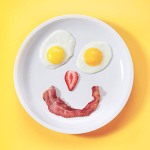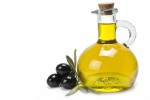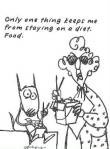Well here we are, the second month into the new year and swiftly approaching the third already.
Can you believe it??
Before you know it, the daffodils will be popping up, the leaves on the trees will be sprouting again and everything will be turning greener and springing into life.
So here’s a question for you…How many of you have fallen off the diet wagon already? Come on now, raise your hands….let’s see…1…2….3,4….5…….6….hmmm….thought so. Don’t worry, my hand was partially up. I haven’t been totally bad, but haven’t been totally good either.
I was reading an article over the weekend that talks about the diet mistakes we make and they’re making us fat instead of the other way around. I admit to sort of doing the second one. How many of these are you guilty of?
SKIPPING BREAKFAST
 Some think that not eating breakfast encourages your body to burn fat when in fact, thin people eat breakfast; fat people don’t.
Some think that not eating breakfast encourages your body to burn fat when in fact, thin people eat breakfast; fat people don’t.
Not eating breakfast leads to overeating later on as your blood sugar drops mid-morning, making you crave foods that aren’t healthy such as that double mocha and Danish. Plus, you are more likely to binge at night as your body plays catch-up on missed calories, making you more likely to store the calories as fat.
So what should you do? Any form of protein in the morning ~ plain yogurt with berries, an omelette, smoked salmon or sugar-free muesli with nuts ~ makes for a breakfast of kings, thin ones! Can’t face having breakfast? Eat a handful of walnuts or almonds about an hour after waking should be enough to stop you bingeing later.
WEEKEND BLOWOUT
 If you eat healthy all week, is it fine to treat yourself at weekends? Even after 5 days of restraint, two days of freestyle carbicide will make you gain weight. (What’s carbicide? Eating every bad carbohydrate within reach!)
If you eat healthy all week, is it fine to treat yourself at weekends? Even after 5 days of restraint, two days of freestyle carbicide will make you gain weight. (What’s carbicide? Eating every bad carbohydrate within reach!)
Let’s say you eat and sensibly manage your carb intake during the week and then binge on lasagna, burgers, bread, cakes, ice cream, etc., over time, you could gain 10 lbs. or more. Carbs are first stored as glucose and water, but will turn into fat if it isn’t worked off, so you’ll need to do extra exercise during the week. Many people equate the weekend with being relaxed so therefore, they relax their eating habits. If you feel compelled to overeat on the weekends, then it suggests the way you’re eating during the week isn’t satisfying you.
So what should you do? Pepper your working week with small amounts of what you fancy, such as a small glass of wine, a piece of dark chocolate or a bite or two of cake. If you end up having a big greasy breakfast on Saturday morning, make sure the rest of your meals for the day are healthy. If you say to yourself ‘oh the damage has been done and I may as well continue for the weekend’, then you’ll gain back weight. That’s how fat people think.
DIET DRINKS
Diet drinks have no calories so they won’t impact on your weight, right? Wrong! People who drink diet sodas are fatter than those who don’t.
Diet drinks feed a sweet tooth as, gram for gram, artificial sweeteners can be 13,000 times sweeter than sugar. When your body receives a sweet taste without the expected calories, it triggers sweet cravings that make you eat more. Sweeteners have also been shown to have a similar effect to real sugar on blood glucose and insulin levels. One study found that a high intake of diet drinks could increase the risk of developing type-2 diabetes by 67%.
So what should you do? Drink water or soda water with fresh lime or lemon or have some decaf or herbal tea or coffee. If you want something sweet, coconut water with nothing added is a natural, healthy choice.
BUT IT’S HEALTHY!
Just because a food is healthy, doesn’t mean you can eat it in excess.
Hummus, pistachios and peanuts contain healthy fats but come will mega calories and often fail the ‘eat just one’ test. Such foods can act as triggers for those with a tendency to overeat. A food labeled ‘healthy’ doesn’t give you the option to just completely ignore calories. Beware of cereals, snack bars and drinks that present themselves as healthy that are anything but. Most people know that if sugar is listed in the first few ingredients, then it’s best to put it back on the shelf. However, you do need to be aware of the sneaky ways that manufacturer’s list sugar on ingredients.
So what should you do? No matter how healthy they are, don’t keep foods around that you find irresistible. Things like raw almonds or Brazil nuts are a better choice than something like wasabi nuts. If you find it difficult to have only 1-2 teaspoons of hummus with your veggies for a snack, then choose something else. Avoid so-called healthy foods with ingredients such as corn syrup, maltose, dextrose, sucrose, fructose or any other word ending in ‘ose’. Some foods produced by weight-loss programs can be high in sugar, artificial sweeteners and refined carbohydrates, which increase appetite.
FAT PHOBIA
 Don’t avoid fat if you want to lose weight. Successful dieters get 30% of their daily calories from fat.
Don’t avoid fat if you want to lose weight. Successful dieters get 30% of their daily calories from fat.
Studies show that the tiny 10% of people who lose weight and keep it off eat moderate amounts of good fats. Fat is highly satiating and keeps you feeling fuller longer. When dieters avoid fat, they are hungry all the time. An obsession with low-fat products merely fuels a craving for fatty foods and that’s why they end up stuffing themselves with cakes and ice cream. Low fat food is pointless because when the fat is removed, it is replaced with something else to retain taste and texture and that is usually sugar and flour, which provide calories but not very good nutrition.
Fat also provides essential vitamins A, D, E and K. Unfortunately, we are now deficient in many of these thanks to the low-fat message, especially vitamin D, which is one of the reasons behind the re-emergence of rickets.
So what should you do? Make sure you eat plenty of good fats, such as omega-3 fatty acids as there is evidence that these help the body burn fat. Oily fish, coconut oil, walnuts and flax seeds are all good sources. Put a small bit, about a 1/2 teaspoon of butter in your morning porridge or on your steamed veggies. Try drizzling extra virgin olive oil on your veggies also as it gives them a nice added flavor.
HOW SUCCESSFUL DIETERS KEEP THE WEIGHT OFF
 90% of people who go on diets regain the weight within a year. The US national Weight Control Registry studied the habits of the 10% of people who did keep off anything from 30 lbs. to 300 lbs. for five years or more. Here’s what they did:
90% of people who go on diets regain the weight within a year. The US national Weight Control Registry studied the habits of the 10% of people who did keep off anything from 30 lbs. to 300 lbs. for five years or more. Here’s what they did:
78% ate breakfast every day. 75% weighed themselves at least once a week. 62% watched less than 10 hours of TV a week. 90% exercised moderately for an hour every day (most chose walking).
IN CONCLUSION…
The only diets that have been proven effective for long-term weight loss in randomized controlled studies are those that focus on higher amounts of protein and vegetables, and limit carbohydrates to those with a low glycemic index (GI). GI is a number rating out of 100 that refers to how quickly a particular food causes spikes in blood sugar. Low GI is considered 55 or under.
Gives you some things to think about, eh?
♥♥ Terri ♥♥
 ¤ Stop Smoking! Probably the number one thing you really should do. Women who stop smoking by the age of 30 reduce their risk of dying of tobacco-related diseases by 97%. Quit by 40 and your risk is reduced by 90%. Stop Smoking Day here in the UK is March 13….next week. What a perfect time to give it up for good!
¤ Stop Smoking! Probably the number one thing you really should do. Women who stop smoking by the age of 30 reduce their risk of dying of tobacco-related diseases by 97%. Quit by 40 and your risk is reduced by 90%. Stop Smoking Day here in the UK is March 13….next week. What a perfect time to give it up for good! ¤ Eat Pasta! White pasta has an undeserved bad image: The Mediterranean diet uses white pasta and is one of the healthiest diets in the world. It proves you don’t have to give up your favorite foods to eat healthy. Pasta is high carb, but low on the Glycemic Index, because the starch molecules are encapsulated in a unique way in the pasta dough. However, don’t overcook it as this breaks down the structures, raising the GI.
¤ Eat Pasta! White pasta has an undeserved bad image: The Mediterranean diet uses white pasta and is one of the healthiest diets in the world. It proves you don’t have to give up your favorite foods to eat healthy. Pasta is high carb, but low on the Glycemic Index, because the starch molecules are encapsulated in a unique way in the pasta dough. However, don’t overcook it as this breaks down the structures, raising the GI. ¤ Crave a dessert after dinner? Brush your teeth after eating. The taste of the toothpaste and the time it takes distracts you, so your craving goes away. Pop a toothbrush in your bag if eating out.
¤ Crave a dessert after dinner? Brush your teeth after eating. The taste of the toothpaste and the time it takes distracts you, so your craving goes away. Pop a toothbrush in your bag if eating out. ¤ Get some sleep! Lack of sleep contributes to obesity as it affects the amount of calories we eat the next day. Different hormones affect men and women after a poor night’s sleep. The hormone ghrelin rises in men, increasing their appetite, and the satiety hormone GLP-I falls in women, so they don’t feel full after eating.
¤ Get some sleep! Lack of sleep contributes to obesity as it affects the amount of calories we eat the next day. Different hormones affect men and women after a poor night’s sleep. The hormone ghrelin rises in men, increasing their appetite, and the satiety hormone GLP-I falls in women, so they don’t feel full after eating.


